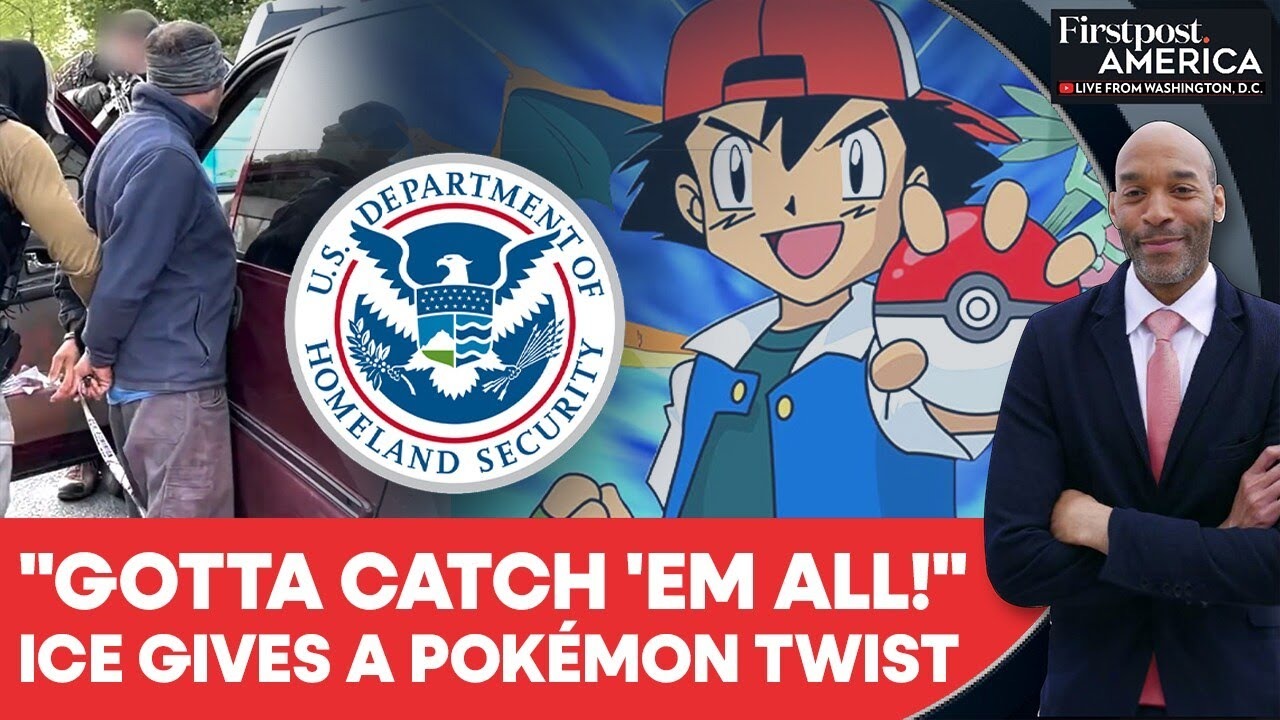Homeland Security’s Pop Culture Strategy Backfires Spectacularly
Popular Now
 Genshin Impact
Genshin Impact
 NBA 2K24
NBA 2K24
 Candy Crush Saga
Candy Crush Saga
 CarX Street
CarX Street
 Warframe
Warframe
 Rust
Rust
 League of Legends
League of Legends
 Poppy Playtime
Poppy Playtime
 Among Us
Among Us
 EA SPORT FC 25
EA SPORT FC 25
 In a bizarre and deeply criticized move, the official Department of Homeland Security (DHS) social media account recently posted a video promoting the latest intensive ICE deportation raids. The short montage, featuring real-world footage of federal agents conducting arrests, was offensively intercut with clips from the original Pokémon anime, set to its iconic theme song, and captioned with the franchise’s world-famous slogan: “Gotta Catch ‘Em All.” The video culminated in mock Pokémon “trading cards” displaying the mugshots and alleged crimes of the detained individuals.
In a bizarre and deeply criticized move, the official Department of Homeland Security (DHS) social media account recently posted a video promoting the latest intensive ICE deportation raids. The short montage, featuring real-world footage of federal agents conducting arrests, was offensively intercut with clips from the original Pokémon anime, set to its iconic theme song, and captioned with the franchise’s world-famous slogan: “Gotta Catch ‘Em All.” The video culminated in mock Pokémon “trading cards” displaying the mugshots and alleged crimes of the detained individuals.
The juxtaposition of a celebrated, family-friendly media franchise—a cultural touchstone for millions globally—with the serious, often traumatic reality of immigration enforcement and mass deportations has drawn universal condemnation. Critics argue that the video constitutes a deliberate and cynical attempt to trivialize the human toll of the raids and to dehumanize those being arrested, comparing them to collectible items in a game. This is a profound breach of ethical communication and a disturbing example of a government agency utilizing pop culture to sanitize a highly contentious political and humanitarian issue.
The Pokémon Company Pushes Back Hard on Intellectual Property Abuse
The controversy escalated almost immediately when The Pokémon Company International issued a strong public statement, confirming that the DHS had neither sought nor received permission to use its intellectual property. The company, which is jointly owned by giants like Nintendo, emphasized its commitment to protecting its brand globally, particularly against association with controversial or political messaging. This rejection of the U.S. government’s actions highlights a significant legal and public relations challenge for DHS.
The unauthorized use of copyrighted material, particularly a high-value brand with a clean, global image, opens the door to potential copyright infringement litigation, which could carry substantial financial penalties. The situation underscores the tension between government agencies leveraging viral internet culture for promotion and the rights of content creators. It also adds the Pokémon Company to a growing list of artists and brands—including musicians and comedians—who have been forced to publicly distance themselves from the current administration’s aggressive and meme-heavy social media strategy on immigration.
 The Dehumanizing Effect of Viral Marketing in Enforcement
The Dehumanizing Effect of Viral Marketing in Enforcement
At the core of the public furor is the ethical dimension of the DHS’s social media push. The “Gotta Catch ‘Em All” phrasing shifts the perception of immigration enforcement from a somber administrative or judicial process to a competitive sport or collection quest. This is far from an isolated incident; the current administration’s immigration policy has consistently sought to frame its efforts with military-style language and aggressive, high-visibility operations that often ignore civil rights concerns.
The Strategic Risks of DHS’s Content:
- Erosion of Trust: Juxtaposing a children’s game with arrests deepens the mistrust between immigrant communities and law enforcement, fostering a climate of fear and uncertainty.
- Brand Contamination: For the government, the public backlash taints the image of the Department of Homeland Security, associating it with insensitivity and poor judgment.
- Legal Exposure: Repeated unauthorized use of licensed media and trademarked slogans demonstrates a cavalier attitude towards intellectual property law, increasing legal and financial risk exposure for the federal agency.
- Distraction from Policy: The viral nature of the content distracts from genuine, necessary public discourse on complex immigration policy and border security solutions.
Looking Forward: An Unprecedented Cultural Clash
The use of a global entertainment phenomenon like Pokémon to promote a divisive enforcement campaign is a landmark moment in the intersection of government communication and digital media. It represents a high-stakes gamble in the arena of viral marketing—a gamble that has alienated a massive public audience and provoked a rebuke from a major international corporation. While the video has garnered millions of views—a metric often sought by digital strategists—the corresponding damage to the government’s perceived legitimacy and empathy is incalculable.
As the administration continues its push for increased deportations, and with reports of record-high ICE activity and a volatile environment surrounding immigration centers, the focus of public discourse should be on legal efficacy, humanitarian concerns, and economic impact—not on juvenile comparisons to a trading card game. This incident serves as a cautionary tale: in the digital age, a government’s attempt at being “hip” can quickly devolve into a catastrophic public relations crisis, alienating its citizens, and risking legal action from the very content creators it seeks to exploit for social media engagement and political messaging.










